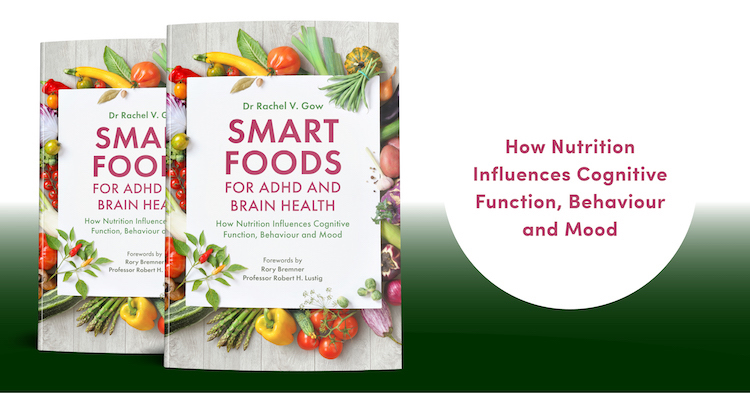
As a Child Neuropsychologist, specialising in neurodevelopmental differences as well as a mother who raised my own son who was diagnosed with Attention Deficit Hyperactivity (ADHD) and Dyslexia around the age of nine, I understand the challenges that learning and behaviour differences can bring.
Life as a young, first-time mum took an unexpected path when it became apparent that my little boy had symptoms of hyperactivity and impulsivity aged around 9. The years that followed were tough, and our journey took us from one professional to the other, trying allergy tests, diets, methylphenidate to vitamin supplements, and every after-school activity imaginable. Some of these activities and interventions helped, but what stood out the most for us was changing his diet.
Through research, education and personal experience, I’ve learned that food affects your brains function, cognitive performance and mood. These key factors which I explain below, are important for children, and adults as well:
- Certain foods can help optimise cognitive function
- Insufficient amounts of critical ‘brain- selective’ nutrients are often found due to poor diet
- There are synergistic roles of both healthy nutrition and exercise
- Alterations in gut microbiome as well as disturbances in gut health have been found in children, and individuals with ADHD & ASD symptoms
Brain Health and Diet
I often feel that it is a great disservice that we still overlook the role of nutrition in brain health. Even in the 21st century, nutrition is often addressed from the neck down, in terms of the prevention of premature diseases such as Type 2 diabetes, obesity, cardiovascular disease and so on, and while nutrition can help reduce risk of all of these it most definitely also plays a fundamental role in the health of our brains!
As a result of my son’s diagnosis, I gave up my career in Real Estate and began an academic journey which spanned over 14 years and resulted in 3 degrees in psychology (BSc, MSc, PhD). My academic training led me to spend 4 years as a Guest Researcher, in the Section of Nutritional Neurosciences at the National Institutes of Health (NIH), Bethesda, Maryland where I engaged in clinical, neuroimaging research supplementing adults with ADHD with omega-3 fats over a 16-week period. My background and training arein the field commonly referred to as Nutritional Neuroscience or Nutritional Psychiatry and I’m also a qualified Registered Nutritionist (under the category of Science).
During my academic journey, I acquired expertise in ADHD, related behavioural differences and the knowledge that food actually affects your brain function!
I learned by experimenting with foods at home, and then professionally during my academic career, that there are ‘brain- selective’ nutrients which are critical for the functioning of our brain and help improve learning, mood and behaviour. When we eat smart and exercise, we feel great!
Making nutritional changes is entirely within your reach as an individual, and it can be a game-changer for overall health and happiness.
Food, Exercise, and Brain Chemicals
The Standard American Diet (SAD) or Western Food Diet is persistently linked to increased risk of poor mental health, as well as the development of problematic eating and food addictions, including the propensity to snack on junk, processed, sugar-rich “comfort” foods. This can cause brain fog, impaired concentration, fatigue caused by sugar highs and lows, and fluctuations in mood.
Certain foods can help optimise cognitive function, elevate mood and switch on attention which should be helpful to frustrated parents and children alike.
There are also synergistic roles of both nutrition and exercise which helps the brain release endorphins (our bodies natural antidepressants), and neurotransmitters serotonin and dopamine which keep our mood and wellbeing in check! For this reason, my book devotes a chapter to food intolerances and sensitivities, as well as explaining the impact of nutritional insufficiencies, how to test for them and importantly how to correct them.
I have personally observed multiple nutrient insufficiencies in the children I have worked with and tested. Vitamins, minerals and omega-3 essential fatty acids are all brain-essential, and I’ve seen a significant lack in children with ADHD and ASD.
Clinical research has also investigated the effects of food additives on children’s hyperactive behaviour. For example, McCann et al. (2007) conducted a randomized, placebo-controlled clinical trial and demonstrated that artificial colours or a sodium benzoate preservative (or both) had a significant adverse effect for all the age groups when compared against the placebo group (McCann et al. 2007). Many of the behavioural reactions resembled symptoms one would expect to observe in a child diagnosed with ADHD.
Here are 5 Nutrition and Exercise Tips to Boost Happy Brain Chemicals:
- Get outside for a daily walk, aim for 30 minutes
Try to go for a walk in nature, make it fun for the children, so they can run around, even climb a tree (safely of course!), explore a wood or forest and find a new location for a hike.
- Increase vegetable and fruit intake in at least one meal each day
Try a blended veggie and fruit smoothie for breakfast. Start with your favourites, and over time add in more greens such as spinach and kale, and other highly nutritious fruits and vegetables. Blueberries are a favourite of mine and you can find lots of recipe ideas by following my @nutritious_minds Instagram account.
- Have bloodwork done to test for nutrient insufficiencies
If you don’t know whether or not you may have nutritional insufficiencies, food intolerances and/or allergies you won’t know how to start. I advise having a baseline test so you can make changes, and then track your results over time.
- Add in nutrient rich foods that can correct any insufficiencies, and explore how they may be related to behaviour and mood
Once you know which vitamins and minerals you’re lacking in, you can come up with a plan to boost foods that are rich in those particular nutrients. Or, if your levels are really low, add supplements for a while, then switch to whole foods which are always best. There are a wide-range of nutrients which are required by the brain for healthy function including: omega-3 fats (EPA + DHA in particular), zinc, iron, iodine, magnesium, selenium and foods which are rich in polyphenols and antioxidants – I have much more on this in my new book.
- Reduce or stop buying packaged and processed food
If it you don’t have it in the house, you can’t eat it. Keep a container of chopped veggies in the fridge, or a bowl of fruit on the counter so that there’s always a healthy alternative on hand. Chop veggies while you’re making smoothie packages and you’re set for the week!
The Gut-Brain Axis Connection
Explained simply, the Gut-Brain axis connection is a bi-directional relationship between the brain and the gut, and how the health of one affects the other. We now know, for instance, that our stomachs make a high percentage of the chemical required for our happiness – serotonin – which is then selectively transported via a special route called the vagus nerve directly into our brain. Hence why the gut is often referred to as our second brain.
The environment of the gut can have effects on learning, memory, mood and stress responses – all factors in ADHD and ASD conditions. Gut bacteria are referred to collectively as the gut microbiome and directly shape who we are, impacting our learning, memory, mood and stress response, not to mention appetite. When we are not feeding our gut healthy foods, we increase risk for a condition called leaky gut syndrome or gut dysbiosis which can negatively impact our ability to absorb nutrients due to damage to the lining of the intestinal tract. The good news is this can be healed, and my book teaches the reader how.
Nutrition is not a miracle cure and there are always other factors at play when evaluating your child’s behaviour. However, nutrition is the single most instantaneously modifiable factor in your control, and my book aims to be your guide.
When a child is given a label of “special educational needs” by a clinician, almost instantly an entirely new language needs to be acquired – the language of disabilities and individual educational plans. There are few directional sign-posts; parents often find themselves on a type of emotional rollercoaster interchanging between hope and despair. I like to take comfort and remind myself, and others, that special children are given to special parents, a belief I subscribe to when taking off my scientific hat.

About Dr. Rachel Gow
I am hoping that my new book will first and foremost remind all parents of neurodiverse children that they are not alone. It shares some of my personal but relatable experiences surrounding parenting and the difficulties and challenges we face raising a child with neurodevelopmental differences. The key message is that what you eat not only has an impact on the body but also plays a significant role in the health and function of our brains!
We simply must consider a role for nutrition in assisting in mood management and cognitive function. The research is there, we just need to heed it. My book contains practical and easy to follow solutions as well as a nutrition guide and delicious recipes for all the family. Importantly, it provides a wealth of contributions from not only leading global experts working in the field of mental health but also from individuals living with diagnostic labels and stories from like-minded parents.
I think what is most brave and heartfelt is the devotion of parents to their children, those who struggle on a daily basis to cope with symptoms and all the clinicians, researchers and professionals dedicated to improving the lives of those with neurodiversities. This book provides stories from all of the aforementioned: stories of hope, triumph in spite of adversity and the very real knowledge that positive change is entirely within your reach. Picking up this book, is definitely a smart choice!
Smart Foods for ADHD and Brain Health can be purchased on Amazon, JKP website and all major bookstores:
My social media links contain a wealth of information, research and support for parents, professionals and individuals alike:
Instagram: @nutritious_minds
Facebook facebook.com/DrRachelVGow
twitter: @drrachelvgow





Leave A Comment
You must be logged in to post a comment.